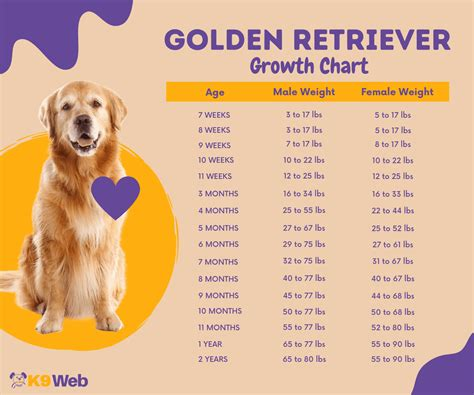Golden Retrievers are beloved family pets known for their friendly temperament and beautiful coats. As a responsible pet owner, understanding your dog's growth and weight patterns is crucial for ensuring their health and well-being. In this comprehensive guide, we'll explore the ideal weight for a 7-month-old male Golden Retriever and provide valuable insights into their growth and development.
Golden Retriever Weight: Understanding the Basics
Before diving into specific weights, it's important to understand that Golden Retrievers are considered a large breed. Their growth patterns can vary, but generally, they experience rapid growth in their first few months, followed by a more gradual increase until they reach full maturity.
Average Weight for a 7 Month Old Male Golden Retriever
According to the American Kennel Club (AKC) and various veterinary sources, a 7-month-old male Golden Retriever should typically weigh between 40 and 50 pounds. However, it's crucial to remember that this is an average range, and individual dogs may fall slightly above or below these numbers while still being healthy.
Golden Retriever Growth Chart: From Puppy to Adult
To better understand your Golden Retriever's growth trajectory, let's look at a general growth chart for male Golden Retrievers:
| Age | Weight Range (lbs) |
|---|---|
| 2 months | 10-15 |
| 3 months | 20-25 |
| 4 months | 25-30 |
| 5 months | 35-40 |
| 6 months | 35-45 |
| 7 months | 40-50 |
| 8 months | 45-55 |
| 9 months | 50-60 |
| 10-12 months | 55-65 |
| Adult (2+ years) | 65-75 |
This chart provides a general guideline, but remember that individual dogs may grow at different rates.
Factors Influencing Golden Retriever Weight and Growth
Several factors can affect your Golden Retriever's weight and growth rate:
- Genetics: The size of your dog's parents can give you an indication of their potential adult size.
- Nutrition: A balanced diet appropriate for large breed puppies is crucial for healthy growth.
- Exercise: Regular, age-appropriate exercise helps maintain a healthy weight and promotes proper development.
- Health: Certain medical conditions can affect growth and weight gain.

Male vs. Female Golden Retriever Growth Patterns
While this article focuses on male Golden Retrievers, it's worth noting the differences between male and female growth patterns:
- Male Golden Retrievers tend to be slightly larger and heavier than females.
- Males typically reach their full height (23-24 inches) by 12 months but may continue to fill out until 18-24 months.
- Females usually reach their full height (21.5-22.5 inches) slightly earlier and tend to be 10-15 pounds lighter than males at maturity.
Maintaining a Healthy Weight for Your Golden Retriever
Keeping your Golden Retriever at a healthy weight is essential for their overall health and longevity. Here are some tips:
-
Follow feeding guidelines: Use the recommendations on your dog food packaging as a starting point, adjusting as needed based on your dog's activity level and body condition.
-
Monitor body condition: You should be able to feel your dog's ribs without pressing hard, but they shouldn't be visibly protruding.
-
Regular exercise: Provide daily walks and playtime appropriate for your dog's age and energy level.
-
Avoid overfeeding: Resist the temptation to overfeed, even if your puppy seems hungry. Consult your vet for appropriate portion sizes.
-
Regular vet check-ups: Your veterinarian can help you track your dog's growth and make dietary recommendations.
Common Health Concerns Related to Golden Retriever Weight
Being aware of potential health issues related to weight can help you maintain your Golden Retriever's health:
- Obesity: Golden Retrievers are prone to weight gain, which can lead to various health problems.
- Hip dysplasia: Excess weight can exacerbate this genetic condition affecting the hip joints.
- Elbow dysplasia: Similar to hip dysplasia, but affecting the elbow joints.
- Arthritis: Maintaining a healthy weight can help reduce the risk and severity of arthritis as your dog ages.
Nutrition for Growing Golden Retrievers
Proper nutrition is crucial for your Golden Retriever's growth and development. Here are some key points to consider:
- Choose a high-quality large breed puppy food until your dog reaches 12-18 months of age.
- Look for foods with appropriate calcium and phosphorus levels to support healthy bone growth.
- Avoid overfeeding, as rapid growth can increase the risk of orthopedic problems.
- Consult with your veterinarian about the best feeding schedule and portion sizes for your dog.
Frequently Asked Questions
Q: Is my 7-month-old Golden Retriever underweight if he's less than 40 pounds?
A: Not necessarily. While 40-50 pounds is average, individual dogs may weigh less and still be healthy. Consult your veterinarian if you're concerned.
Q: How can I tell if my Golden Retriever is overweight?
A: You should be able to feel your dog's ribs without pressing hard. If you can't feel the ribs easily, your dog may be overweight.
Q: When do Golden Retrievers stop growing?
A: Golden Retrievers typically reach their full height by 12 months but may continue to fill out and gain muscle mass until 18-24 months of age.
Q: How often should I weigh my Golden Retriever puppy?
A: It's a good idea to weigh your puppy every 2-4 weeks during their first year to track their growth.
Conclusion
Understanding your Golden Retriever's growth and weight patterns is essential for ensuring their health and well-being. While a 7-month-old male Golden Retriever typically weighs between 40 and 50 pounds, remember that each dog is unique. Regular vet check-ups, proper nutrition, and appropriate exercise are key to maintaining your Golden Retriever's ideal weight throughout their life.
By staying informed and attentive to your dog's needs, you can help your Golden Retriever grow into a healthy, happy adult dog that will be a cherished family member for years to come.
